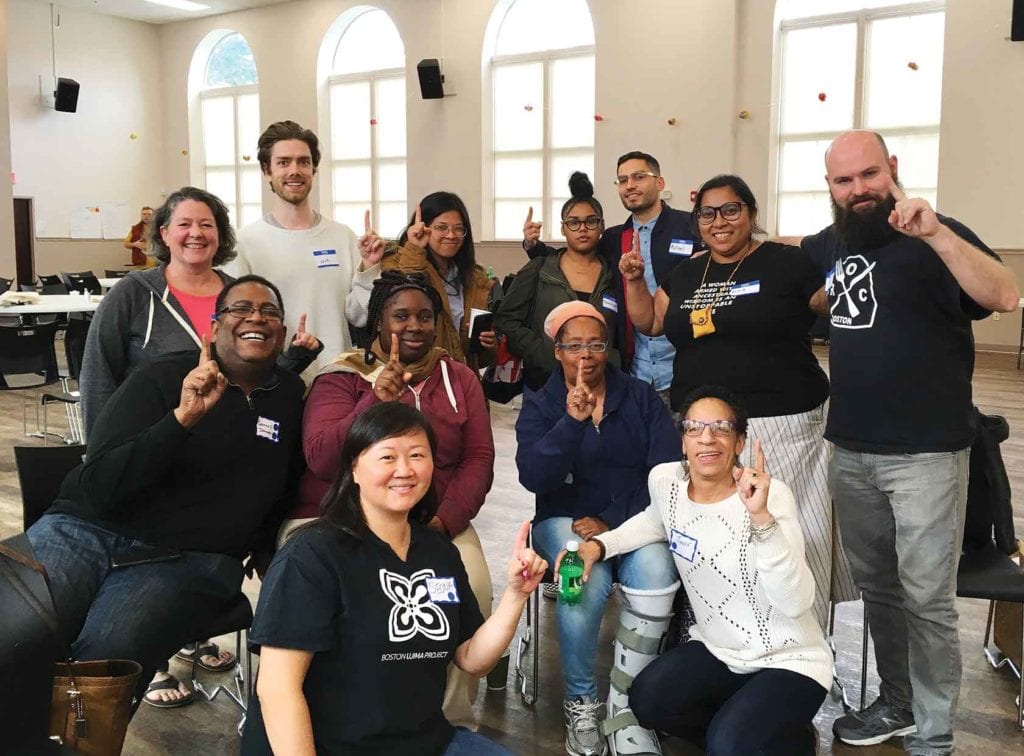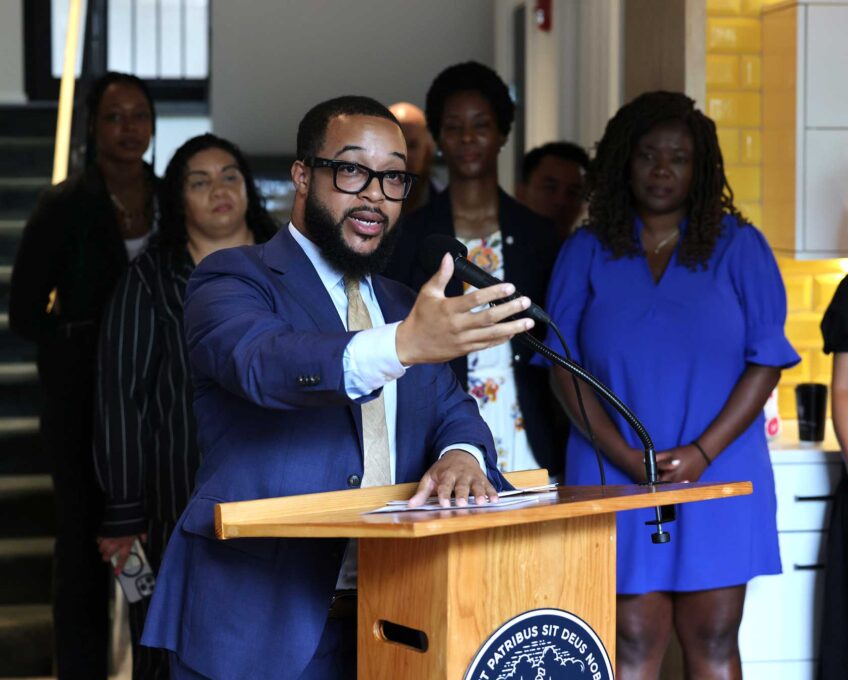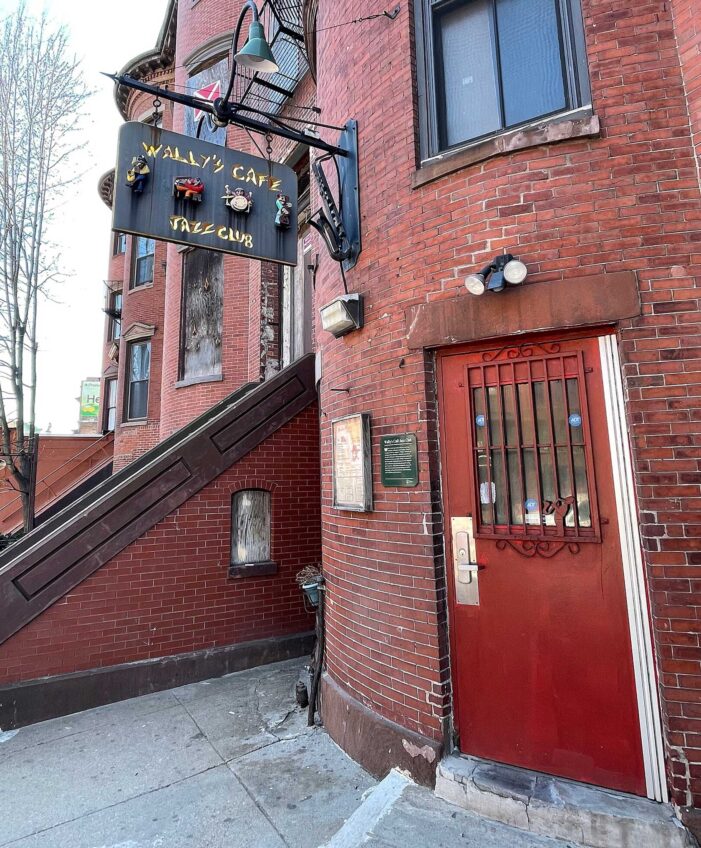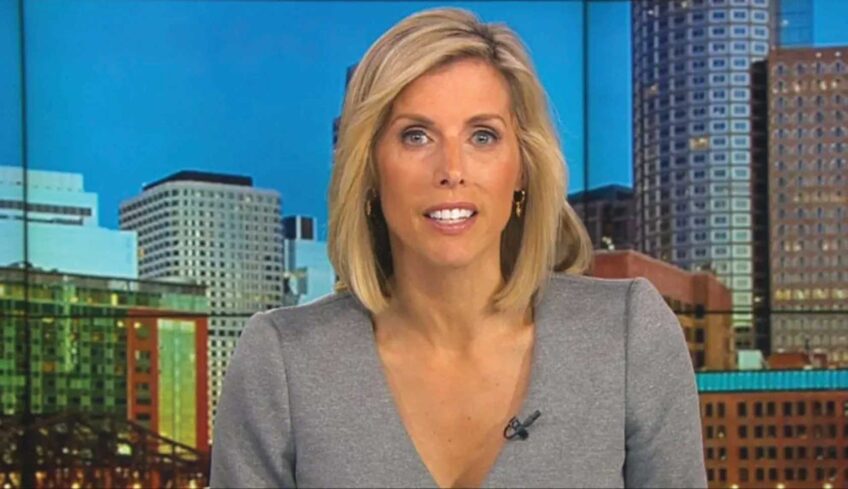Community fund launched
Ujima Project to raise $5m investment fund for local businesses

The Boston Ujima Project last week announced the launch of the nation’s first democratic investment fund. Through the Ujima Fund, community residents and other investors will create a pool of funds to be allocated by local stakeholders in ways that benefit Boston neighborhoods and businesses.
The initial goal for the fund is to raise $5 million by 2020 and use the funds to provide loans to Boston entrepreneurs in communities of color. Organizers expect the first loans to be offered by mid-2019.

Boston Ujima Project Executive Director Nia Evans looks on while Ujima member Darris Jordan (r) speaks at a Dec. 13 press event for the Ujima Fund launch. PHOTO: SANDRA LARSON
Who should invest in the new fund? Anyone who can, organizers say. Working-class Massachusetts residents can start investing with as little as $50. While others will be large accredited investors putting in $5,000 or more, the hope is that a significant number of the investors are ordinary Bostonians who have a stake in the success of local neighborhoods and small business owners of color.
“Our hope is for thousands of people who are living in Roxbury, Dorchester and Mattapan to be investors in the Ujima Fund, and for hundreds to ultimately receive lending from it. The goal is for it to be a mass community fund,” said Aaron Tanaka, director of the Center for Economic Democracy and one of the Ujima Project’s co-founders.
Nia Evans, the Ujima Project’s executive director, put it even more directly.
“If you live in Boston, you should invest. If you identify as a person of color or as a working-class person in Boston, you should definitely invest,” she said. “Be the first person to invest, and consider it yours.”
Ujima’s evolution
Seeds for the Ujima Project were planted when a study group made up of more than 40 organizations, business owners and impact investors and sponsored by City Life/Vida Urbana, the Center for Economic Democracy and Boston Impact Initiative gathered in 2014 to learn about community finance. The Ujima concept emerged and volunteers began to build interest with organizing and outreach.
The urgency to create a community-driven economy in Boston was heightened by a 2015 Federal Reserve report that revealed the city’s massive racial wealth gap. Historical barriers to home ownership and unequal access to education, employment and entrepreneurship contributed to this gap. Making matters worse, Boston is one of the fastest-gentrifying cities in the nation, with rising rents threatening to displace residents and businesses.
Ujima’s 2016 pilot investment experiment crowdfunded $20,000 from more than 175 people, who then voted to distribute loans to five local black and immigrant-owned businesses.
One of those businesses was Bowdoin Bike School, which used its loan to purchase a point-of-sale system that increased efficiency and helped the business expand. Today, owner Noah Hicks De Amor and his team are preparing to open a full-service bicycle shop and café in Uphams Corner.
An inaugural citywide assembly in September 2017 solidified Ujima as a membership organization. At that time, the fund was expected to launch by the end of 2017, but it took longer than expected to make final decisions and get all the legal paperwork in place, said Lucas Turner-Owens, Ujima’s fund manager.
Activity ramped up over the past year with 50 weekly member meetings, three neighborhood assemblies, and workshops on financial and political education. During a two-day citywide assembly in October, members voted to approve 36 specific “good business” standards to define eligibility for the Ujima Business Alliance. Businesses in the UBA gain greater community support and opportunities for anchor institution contracts and Ujima Fund loans.
Ujima will vet businesses on factors like percent ownership by people of color, fair scheduling, supplier diversity, environmentally sustainable practices and eliminating the dual-tier wage system by which tipped employees are paid less than minimum wage.
A non-traditional fund
Several elements set the Ujima Fund apart from other community fund models, Turner-Owens said. Besides making lending decisions democratically, Ujima prioritizes community investors over larger investors. For instance, if there is a higher loan default rate than expected, the Ujima Fund pays back small community investors first, followed by higher-net-worth investors and foundations.
“This is not traditional,” Turner-Owens explained. “Most funds reward folks with the most wealth.”
In addition, Ujima intends to take a more sensitive and flexible approach toward small business borrowers. At the October citywide assembly, members hashed out and voted on some loan structure decisions that make capital access more friendly, such as not forcing entrepreneurs to put up homes or existing business assets as collateral.
Growth and activity
Ujima now has more than 400 members. About 250 are voting members, meaning they meet the criteria of identifying as people of color and/or working-class and Boston residents or displaced from Boston. Other member types include non-voting “solidarity members” — supporters who live outside Boston or who are not working-class or people of color — along with grassroots partner organizations and Good Business Alliance entrepreneurs and employees. The fee to become a member ranges from $25 for general membership to $5 for youth ages 14 to 24.
Weekly meetings are held at City Life/Vida Urbana in Jamaica Plain. Member subcommittees focus on arts and culture, business support, youth engagement and anchor institution outreach and other goals.
People can be members without investing in the Ujima Fund, and can invest without being members, but Evans emphasized the value of doing both. She urges Boston residents to “not only become an investor, but a member, a shaper of what your investments are used for.”
For information on how to invest online or by mailing a check, see Ujima’s website or email invest@ujimaboston.com with questions.
A learning process
Ujima Project member Darris Jordan serves on the outreach and recruitment committee. At a recent press roundtable event held at Dudley Café (an early UBA member), the lifelong Dorchester resident spoke of his experience.
“When I first heard of Ujima,” he said, “I thought, this shouldn’t really be so radical, this idea of people investing in their neighbors and communities and the businesses they frequent.”
But working in Ujima’s outreach effort, Jordan has seen firsthand how much work and time it takes to bring the idea to fruition and to educate, convene and fully involve community members.
“It’s been a learning experience, finding ways to bring people into the fold and make it less overwhelming,” he said. “What’s most exciting to me is that we’re laying the groundwork, giving something roots so it’s here for a long time. Down the line, people will really have this [democratic economy] mentality — it’ll be the new normal.”
On the web
- Boston Ujima Project: www.ujimaboston.com
- 2015 Federal Reserve “Color of Wealth” report: www.bostonfed.org/publications/
one-time-pubs/color-of-wealth.aspx






